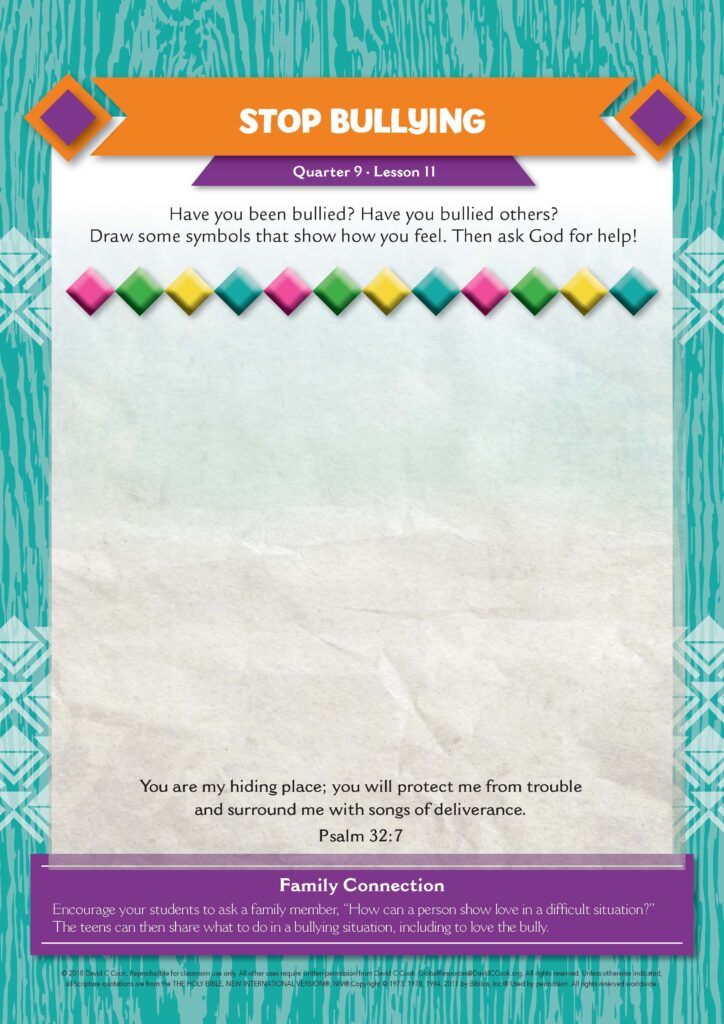During the lesson, the information for you to know is written in regular type, and what we suggest speaking or reading aloud to children is in bold. All resources for this lesson, including the Teacher Guide, Student Page, Family Connection Card, and other resources can be downloaded in a ZIP file by clicking on the following link:
In some lessons you will find "resource articles." These are articles written by experts from around the world to help equip you for your work with children and adolescents. Share them with parents or guardians if you consider it appropriate.
Love your enemies, do good to those who hate you, bless those who curse you, pray for those who mistreat you.
Luke 6:27–28
When Jesus shared this message, it must have shocked many who heard Him—and these words still surprise us today. By human standards, being unkind to those who are unkind to us seems right and just. But by God’s standards, the only right response to hate is love. So how should we respond to those who bully others? A bully is someone who uses words, power, or strength to intimidate others. We might think the best way to respond to such a person is with force or anger. But Jesus shows us that the only way to truly stop bullying is to bring peace instead.
Is there a person in your life who uses power as a weapon? Pray for him. Do you know someone who misuses her authority to manipulate others? Love her. Though your heart may not change right away, make every effort to respond to curses with blessings. When we apply God’s standards instead of our own, we begin to see that His way is always best.
Encourage your students to ask family members, “How can a person show love in a difficult situation?” The teens can then share what to do in a bullying situation, including to love the bully.
Teacher Tip: If possible, email or text the Family Connection Card to the families of your students.
Greet your students warmly as they come to class. Ask if any of them were able to use the tips about making and being good friends this past week.
Ask the students to stand in a circle with you. Hold up a clean, unwrinkled piece of paper where all the students can see it. Tell the students you will pass the paper around the circle. Each student will fold it, bend it, crumple it, stomp on it, or make a small tear in it. Begin passing the paper around the circle. When the paper gets back to you, hold it up so the students can see it.
This piece of paper does not look the way it did before we passed it around the circle. What happened to it?
Allow 2–3 students to share what they did to the paper.
Even though each person only damaged the paper in a small way, the paper is not the same as when I first showed it to you. Now I will pass the paper around the circle again. This time, I want you to try to undo what you did before to the paper.
Pass the paper around the circle again. Encourage the students to try to smooth it or reattach the small pieces that were torn off. The teens may think this is silly, but encourage them to try to fix the paper and then pass it to the next person. When the paper gets back to you, hold the paper up again.
Does the paper look like it did when I first showed it to you? Why or why not?
Smoothing out the paper did make it a little better, but it is different. It has wrinkles and rips. It will never be the same as it was when I first showed it to you.
Today we are going to learn about bullying. Bullying hurts people in similar ways to what we did to this paper. Even an insult or a hurtful word can cause painful and permanent damage.
What is bullying?
Allow 2–3 teens to share their ideas. Help the students to understand that bullying means using power to intentionally tease, exclude, abuse, or hurt others and make them do what is demanded.
In what ways could bullying be like damaging the paper?
Allow 2–3 teens to share their ideas.
Bullying causes permanent damage. It can make people feel helpless, hopeless, and unworthy. Even when a person apologizes, the damage has been done, and it cannot be undone. Today we will learn positive ways to respond to bullies and how to trust God when we have been bullied by others.
Bullying can be very damaging. The pain can be very deep. Bullying can cause depression, anxiety, loneliness, health problems, and problems in school. Victims of bullying may struggle with anger, and they may behave violently. They may abuse drugs and alcohol. The effects of bullying can last for many years. Sometimes victims even choose to commit suicide rather than continue to live with the pain and shame.
As we saw with the crumpled paper, the damage of bullying cannot be undone. But there are things you can do if you are being bullied.
1. Get away. If possible, walk or even run from someone who is bullying you. It is best not to respond at all to the bully because it may only increase the bullying. If you are in physical danger, it is okay to defend yourself until you can get away and get help.
Warn a divisive person once, and then warn them a second time. After that, have nothing to do with them.
Titus 3:10
2. Get help. Tell a parent, teacher, pastor, or another trusted adult about what is happening to you. Bullies often use their power to make someone else feel intimidated. Adults can give you wise advice about how to handle a difficult situation. Listen to what the Bible tells us about seeking wisdom.
The way of fools seems right to them, but the wise listen to advice.
Proverbs 12:15
3. Protect yourself. Try to protect yourself from bullying by staying in groups, not walking alone, and staying in public areas near trusted adults. If possible, avoid situations where you have been bullied and people who have bullied you.
If you are using the Memory Verse Poster, show it to the students.
If it is possible, as far as it depends on you, live at peace with everyone.
Romans 12:18

4. Ask God for help. God is the great defender. He is also the source of all wisdom. He can help you avoid bullying situations and can give you wisdom on how to respond or protect yourself. His healing power can heal you if you have been bullied. Listen to what the Bible tells us about God’s help for His people.
I lift up my eyes to the mountains—where does my help come from? My help comes from the Lord, the Maker of heaven and earth.
Psalm 121:1–2
Let’s talk about some situations where someone is being bullied. As I read these situations, think about what you would do if you were in the same situation. Could 1 of the ideas we have learned today help? How?
Sometimes we can prevent bullying or protect ourselves from bullies. But other times, there is nothing we can do to make the situation better. When we are bullied, we may feel hurt, angry, and afraid. We may want to hurt the bully the way we have been hurt, but this only continues the problem. It does not make the situation better. There is a better solution in the Bible.
But to you who are listening I say: Love your enemies, do good to those who hate you, bless those who curse you, pray for those who mistreat you.
Luke 6:27–28
The Bible tells us to love our enemies. This may seem impossible. How can we love people who hurt us? It is not easy, and it often takes a long time. But when we respond to bullies with love, the bullying may happen less. As we continue to respond with patience and kindness, eventually the situation may change.
Have the students find partners.
Now let’s practice what we have learned. Choose 1 of the situations we just talked about. Act that situation out with your partner. Remember the ideas we learned today: get away, get help, protect yourself, and pray. You can use the ideas we learned, or you can try another idea you have.
Give the students 5 minutes to act out the situations. Then have them stand in a circle. Hold up the piece of paper from the Connecting activity.
Bullying causes great harm. The damage changes a person’s life. Look at this piece of paper. You may have been hurt by bullying, or you may have bullied someone else and caused pain.
Hand the paper and a pencil to a student.
Optional: If you are using the Student Pages, the teens can do the activity on their pages.

As I pass around the paper again, think about your situation. When the paper reaches you, draw a symbol on it to show how you want to respond to your situation. For example, if you are afraid, you might want to draw a strong arm. If you are angry, you might want to draw a peaceful river. If you have done something you regret, you might want to draw a cross to represent forgiveness. Then pass the paper to the next person.
Give the students a few minutes to respond.
Whether you are the victim of bullying or you have bullied someone else, you can trust God to help. The Bible tells us that God is our protector. He helps in times of trouble.
You are my hiding place; you will protect me from trouble and surround me with songs of deliverance.
Psalm 32:7
Ask God to give you wisdom to handle your situation. Ask Him to protect you. Ask Him to forgive you for the ways you have hurt others. Though all of us have been damaged by the hurtful things others have done, God can heal us if we ask.
Close with this blessing based on Matthew 5:43–45:
Blessing: May our gracious and loving God give you strength to love your enemies and to pray for those who hurt you so that you may be true sons and daughters of your Father in heaven.
Lead the children in singing this quarter’s song, if possible.
Life on Life ©2020 David C Cook. Reproducible for home or classroom use only. All other uses require written permission from David C Cook [email protected]. All rights reserved.